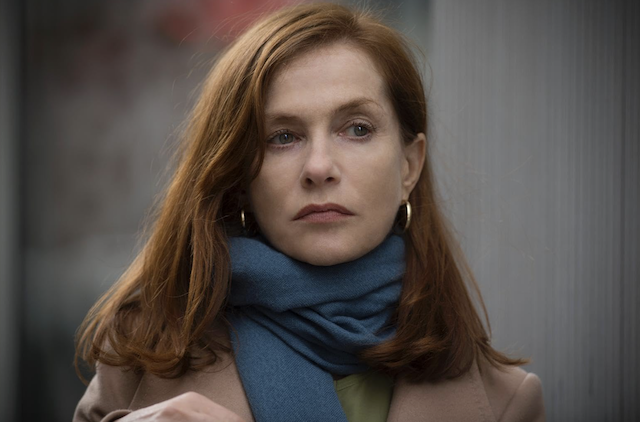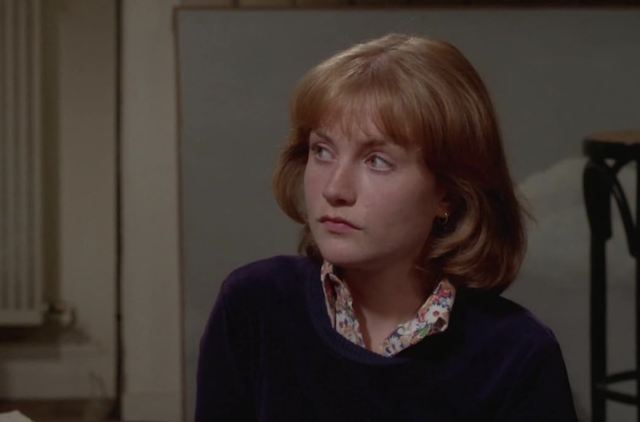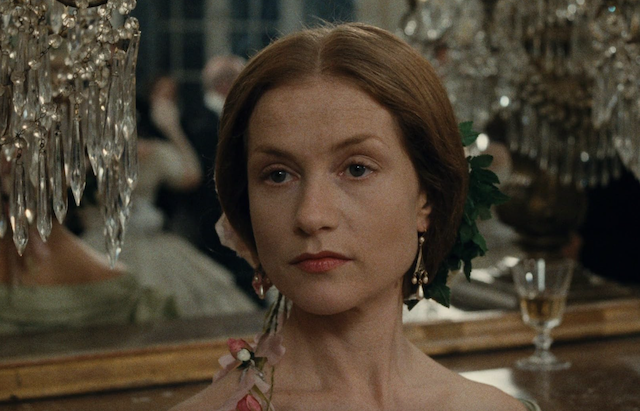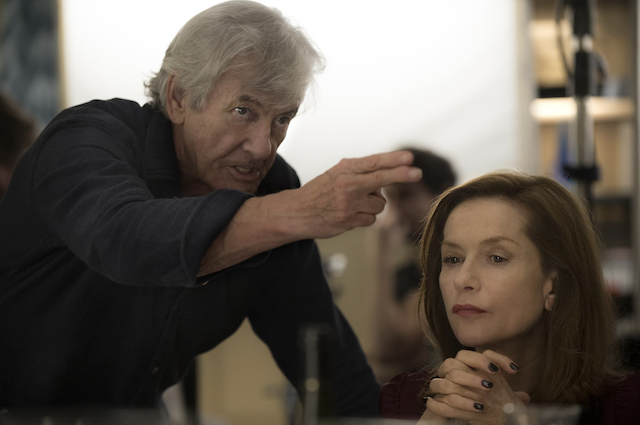
©Elle, Isabelle Huppert
In a scene in The Lacemaker (La dentellière, 1977), Isabelle Huppert’s character is led with closed eyes by her lover. He takes her closer and closer towards a steep cliff and open sea. There she opens her eyes, and he asks, “do you trust me”? “Of course,” she replies. The scene has become a metaphor for all her work as an actress. Always blind when approaching unknown ground, but at the same time there’s trust, excitement, and a closeness to danger.
It all begins with her international breakthrough film The Lacemaker by Claude Goretta. Huppert became a full-fledged French star at Cannes Film Festival as the shy and mysterious hairdressing student Pomme, who is betrayed by her bourgeois boyfriend, suffers a nervous breakdown, and ends up in a psychiatric institution. It’s here she showed her famous gaze to the world, that bores its way through the screen. And set the bar for her career.
Ever since, Huppert has been associated with the bold, the deep, the dangerous and the almost Bressonian lack of expression. She has been called “the world’s most dangerous actress”, “French film’s most beloved psychopath” and “cinema’s most fearless screen presence”. Over the decades, she has appeared as spiritually dark and morally ambiguous women, playing the extremes, unorthodox and occasionally monstrous characters. As both victims and perpetrators, she explores the dark side, becoming a sort of femme fatale of broken souls.

©The Lacemaker, Isabelle Huppert
Huppert has, of course, played many roles other than those considered demonic, in over 150 films since her debut in 1971. But they seem to have been etched onto the retinas of many. It is difficult to forget the prostituted teenager in Violette Nozière (1978), the family massacre in La cérémonie (1995), her self-torture in The Piano Teacher (2001), or the incestuous mother in Ma mère (2004). Her cool restraint, elegance and mystery have dominated French cinema for a long time, and she has a reputation for being easy to work with – a director’s dream. The diverse group of directors she has collaborated with are untested names and veterans, French and non-French, in France or abroad, like Claude Chabrol, Claire Denis, Jean-Luc Godard, Mia Hansen-Løve, François Ozon, Maurice Pialat, Bertrand Tavernier, Catherine Breillat, and Olivier Assayas. From Hong Sang-soo, Raúl Ruiz, Brillante Mendoza, Joachim Trier, Jerzy Skolimowski, Michael Cimino, Andrzej Wajda to the Taviani brothers, and Michael Haneke – the crème de la crème of auteurs.
As a little girl in 1950s Paris in the well-off liberal family, her favorite stories were Hans Christian Andersen’s The Little Mermaid and The Little Match Girl – two dark fairy-tale characters she wanted to play. Already at the age of 12, she decided to become an actress after seeing the Russian Mikhail Kalatozov’s The Cranes Are Flying (1957). In her early 20s, she stood out and had become a household name in France. She caught the eye of directors such as Jean-Luc Godard and Otto Preminger and French New Wave legend Claude Chabrol who gave her the leading role in the acclaimed Violette Nozière, where Huppert’s impoverished teenager prostitutes herself at night and murders her father – she won the best actress award at Cannes. It is specifically in Chabrol’s films that she plays the coldest women.
Chabrol and Huppert made seven films together. In Story of Women (Une affaire de femmes, 1988), that is based on a true story, she plays the poor, treacherous, married mother with two small children during World War II, who builds a business device by performing Vera Drake-like abortions and turning her friendship with a prostitute into a lucrative enterprise while cynically deceiving her husband. Her character was one of the last women to be executed by guillotine in France.
In the adaptation of Gustave Flaubert’s novel Madame Bovary (1991), Chabrol explores dark romantic pessimism in one of the most famous characters in French literature. Huppert has called her a “feminist without knowing it” as her Emma Bovery, who feels trapped throughout her life and marriage, pursues scandalous sexual liaisons.
In one of her most memorable performances, in the superb La cérémonie, she massacres an entire upper-class family. Her charming, chatty, and jealous post office cashier, Jeanne, looking like an adult Pippi Longstocking, with a suspicious past (did she kill her only child?), befriends the introvert Sophie (Sandrine Bonnaire) who works as a maid in residence for the well-off Lelièvre family. The outgoing and eccentric Jeanne stands out in Huppert’s filmography compared to her many controlled roles. Here she’s explosive.

©Madame Bovary, Isabelle Huppert
As a contrast, in Nightcap (Merci pour le chocolat, 2000), Huppert plays the privileged and calculating ice-queen who is married to a pianist and specializes in hot chocolate with dubious content. Chabrol made, with ease and calm, a dark thriller/comedy with tragic revelation with Huppert’s characters gliding about in the clean house with mean intentions. Chabrol once said that she is one of very few that expresses things without changing her face, and that their collaborations have been characterized by a silent consensus. They spoke to each other in other ways, mainly through camera angles and staging – a dialogue without explanations.
Michael Haneke is another director who seems to admire her. He is known for his psychological brutal, unpleasant portraits with dark menacing emotions and middle-class hypocrisy. They made four films together and he wouldn’t have done the excellent The Piano Teacher (La pianiste) without her – one of the most celebrated roles in her career for which she won another prize in Cannes. Based on the Nobel Prize winner Elfriede Jelinek’s book, about masochistic humiliation and the world of classical music, Huppert plays a repressed piano professor, Erika Kohut, at a Viennese conservatory with both self-destructiveness and superhuman ideals, who sadistically degrades her students and lives with her mother in a codependent relationship. She starts to satisfy her masochistic urges more literally when she gets involved with the student Walter (Benoît Magimel), causing her controlled life to shake. The first role Haneke offered Huppert was in the gruesome Funny Games (1997) in which two well-dressed young men slaughter a family of children. She refused the role, thinking the script was too theoretical, too nasty.
In The Piano Teacher her character invites sexual violence into her life and in Paul Verhoeven’s Elle (2016) she seems to go after it in a dangerous roleplay. In the Dutch provocateur’s film, Huppert plays the frozen, divorced co-founder of a successful videogame company who is raped in her house by a masked attacker but won’t call the police – she is the daughter of an imprisoned serial killer. Huppert was drawn to the role because it explores an ambiguous situation of attraction, lust, and the will for revenge. She received her first and only Oscar nomination, and won a César and a Golden Globe, for the role.

©Elle, Paul Verhoeven, Isabelle Huppert
But in her long career, Huppert hasn’t had the desire or ambition to shine in Hollywood. Nor being tempted by money or celebrity. She once said she is becoming more fragile in English, a smaller version of herself, although she has dipped her toes in English speaking territories such as Michael Cimino’s Heaven’s Gate (1980), (a commercial flop and unpleasant experience for Huppert), Curtis Hanson’s The Bedroom Window (1987), David O. Russell’s I Heart Huckabees (2004) and Ira Sachs’ Frankie (2019). She has expressed a desire to do a New York comedy with Noah Baumbach and Woody Allen as well as enter the Kelly Reichardt’s universe. One American director she did decisively go after was Hal Hartley. The indie director specially wrote her a role in his film Amateur (1994), where she does another of her morally ambiguous characters as the former nun turned porn novelist. Hartley thought of Huppert being perfect as a Hitchcock heroine: cold-blooded and aloof.
Irish director Neil Jordan had been taken by Huppert’s darker roles and casted her in his kitschy stalker-thriller Greta (2018). Here she plays a sophisticated lonely piano teacher (again) in New York who becomes unhealthy obsessed with a young waitress (Chloë Grace Moretz). Greta will not be mentioned as a milestone in Huppert’s career, but few others could have portrayed the character. Up until Greta, Huppert had affirmed, in various ways, that she has never played an evil woman, only women in evil situations – that she tries to empathize with them, not sympathize, tries to understand how good and bad interact within each person.
She told me once, in an interview for Greta: “I must admit, Greta is a monster. She is different from all my other roles that I’m known for, the supposed monsters. But I’ve never seen them that way. They just have complex and sometimes distorted behaviors. The dark is part of our reality. When you read newspaper articles, you are always amazed that the line between normality and madness is so thin. Those who have committed terrible crimes are often described as very normal by those who have come close to them.”
Controlled exterior, shabby interior. Huppert is said to carry many extremes within her with an ability to suggest, with subtlety. She always reinvents herself with her hard-to-read face and pushes the boundaries of what is expected of her. Huppert gets high on the contradictory, on what is hidden. On what forces the viewer to try to understand, go beyond the visible and seek the invisible. Huppert doesn’t believe in the idea of playing a character, only the idea of playing states such as joy, anger, and sadness. For her, acting is a way to embrace the ambivalent, to understand suffering and to live out one’s madness.

